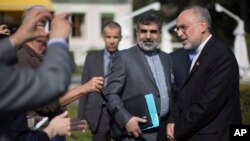Iran's nuclear chief said Tuesday that Iranian officials had reached a mutual understanding with the United States and its negotiating partners on most issues in nuclear talks, but the White House sought to temper optimism about an imminent deal.
Ali Akbar Salehi told Iranian state television that one important difference remained and that officials would try to resolve it by late Tuesday. He said if that happened, all parties would be in agreement on technical matters being discussed in Switzerland.
He did not say what the one difference was.
"Of course, there are many details, but I can say that as a whole, I am optimistic" about a deal before the deadline, Salehi said. "We have agreed on 90 percent of the technical issues."
In Washington, White House spokesman Josh Earnest said the two sides had made "substantial progress" over the past year, but that there was a 50 percent chance "at best" of reaching an agreement.
A senior U.S. official, speaking to reporters on condition of anonymity, said, "We have definitely made progress in terms of identifying technical options for each of the major areas," but "we still have a ways to go."
The official said any framework agreement settled this month would need to have key details, including numbers. "If there is an agreement, I don't see how it could be meaningful without having some quantitative dimensions," he said, without elaborating.
Officials at the talks are trying to get closer to an outline of an agreement that would ensure Iran's nuclear program is peaceful in exchange for easing economic sanctions that have hurt Iran's economy.
Two deadlines
The sides are working to meet two target dates: a framework in the next two weeks that lays down the outlines of a final deal by the end of June.
U.S. Secretary of State John Kerry and Iranian Foreign Minister Mohammad Javad Zarif have taken the lead in what formally remain talks between Iran on one side and the United States, Russia, China, Britain, France and Germany on the other.
Most of the disputes focus on technical issues, such as the numbers of centrifuges that Iran would be allowed to operate as part of an agreement. The machines can enrich uranium up to levels used for the fissile core of nuclear arms, but Iran says it has only energy, medical and scientific aims.
Salehi and U.S. Energy Secretary Ernest Moniz joined the talks last month to try to iron out the technical differences.
Kerry and Zarif met Monday for nearly five hours in the Swiss city of Lausanne, before the Iranians departed for Brussels for talks with European negotiators.
There, EU foreign policy chief Federica Mogherini said, "We are entering a crucial time, a crucial two weeks." German Foreign Minister Frank-Walter Steinmeier said after "more than 10 years of negotiations, we should seize this opportunity." British Foreign Secretary Philip Hammond said all sides were committed to trying.
Political directors from Russia, China, Britain, France and Germany began arriving in Lausanne on Tuesday and were due to meet on Wednesday, the EU said.
A letter by Republican senators to the Iranian leadership warning that Congress could upend any deal cast a shadow on the negotiations. Another senior American official, also speaking on condition of anonymity, said the issue came up at Monday's Kerry-Zarif meeting as well as at a Sunday gathering among senior U.S. and Iranian negotiators.
Republicans argue a deal would be insufficient and unenforceable, allowing Iran to become a nuclear-armed state. To that end, they've delivered a series of proposals to undercut or block an agreement, including ones that would require a Senate say-so on a deal and order new sanctions against Iran while negotiations are underway.
President Barack Obama and other officials insist they're not going to make any deal that would allow Iran to acquire nuclear weapons.
The deal taking shape would limit Iran's uranium enrichment and other nuclear activity for at least a decade, with the restrictions slowly lifted over several years.
Some material for this report came from Reuters and AP.





